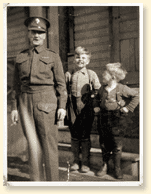

Company Sergeant-Major John Osborn, Winnipeg Grenadiers, who
would posthumously win Hong Kong's only Victoria Cross. In pre-war
Depression days, "many times he went out and scrubbed floors
to get a little money for his family." |
Hong Kong, December 1941
It seemed unlikely that the Pacific Ocean British colony of Hong
Kong, guarded by only four at the outbreak of war, could
be held if the Japanese chose to mount a serious attack.
Nevertheless, military leaders in London convinced themselves that
the Japanese might be scared off by a show of force. They asked
Canada for help. Prime Minister Mackenzie King, usually cautious but
not this time, agreed. For this duty, the army staff selected the Royal Rifles of Canada, a bilingual
from Quebec City, and the Winnipeg Grenadiers who had served respectively
in Newfoundland and Jamaica. Neither unit was adequately trained.
These units arrived in Hong Kong on November 16, 1941. The Japanese
attack began three weeks later. Not even the best troops could have
stopped the more numerous and better-prepared Japanese troops.
Within ten days the Japanese 38th , helped by extra
artillery and infantry, overran the defences on the mainland portion
of the colony. On December 18, the Japanese landed on Hong Kong
island itself. The defenders fought back as best they could, grimly holding onto their
positions and counterattacking repeatedly. The Canadian commander, Brigadier
J.K. Lawson, was killed fighting with a pistol in each hand when his
headquarters was overrun on December 19. Sergeant Major John
Osborn of the Grenadiers died when he threw himself on a Japanese
hand grenade to save his comrades. His bravery was recognized with
the Victoria Cross.
Hong Kong surrendered on Christmas Day 1941. Of the 1,975 Canadians,
290 were killed and 493 wounded. A further 260 died in the awful
conditions of prison camps in Hong Kong and Japan ( see Canadian Prisoners
of the Axis Powers ).
Related Newspaper Articles
English Articles
French Articles
-
Troupes canadiennes à Hong Kong
Le Devoir, 17/11/1941
-
Le Canada participera à la guerre en Orient
Le Devoir, 03/12/1941
-
Tentative d'invasion japonaise à Hong Kong
Le Devoir, 09/12/1941
-
A Hong Kong
Le Devoir, 10/12/1941
-
Soldats canadiens blessés à Hong Kong
Le Devoir, 11/12/1941
-
"Furieuse bataille dans la région de Tanchi, au nord de Hong Kong"
Le Devoir, 15/12/1941
-
La presse de Londres fait prévoir la chute de Hong Kong - Hong Kong
Le Devoir, 16/12/1941
-
Les troupes canadiennes
Le Devoir, 17/12/1941
-
"Hong Kong - La garnison anglo-canadienne reste encore maîtresse d'une partie de l'île"
Le Devoir, 19/12/1941
-
Le général Lawson aurait été tué à Hong Kong
Le Devoir, 23/12/1941
-
La granison britannique dépose les armes
Le Devoir, 26/12/1941
-
Les Canadiens français à Hong Kong
Le Devoir, 27/12/1941
-
"Le Canada reconstituera les bataillons de Hong-Kong"
Le Devoir, 07/01/1942
-
Mémoire du ministre de la défense sur la campagne de Hong-Kong
Le Devoir, 22/01/1942
-
Hong-Kong. L'ennemi aurait tué un tiers de la garnison
Le Devoir, 04/02/1942
-
Atrocités commises par les Japonais à Hong-Kong
Le Devoir, 10/03/1942
-
Le rapport Duff sur Hong Kong
Le Devoir, 06/06/1942
-
Les nageurs de Hong Kong
Le Devoir, 16/01/1943
|